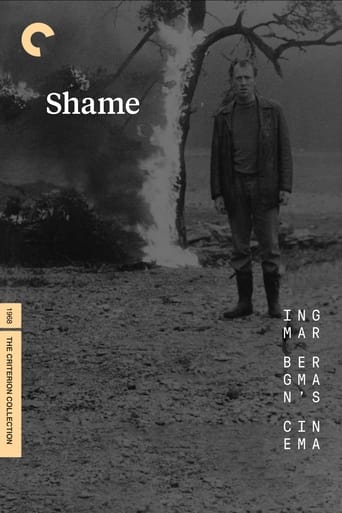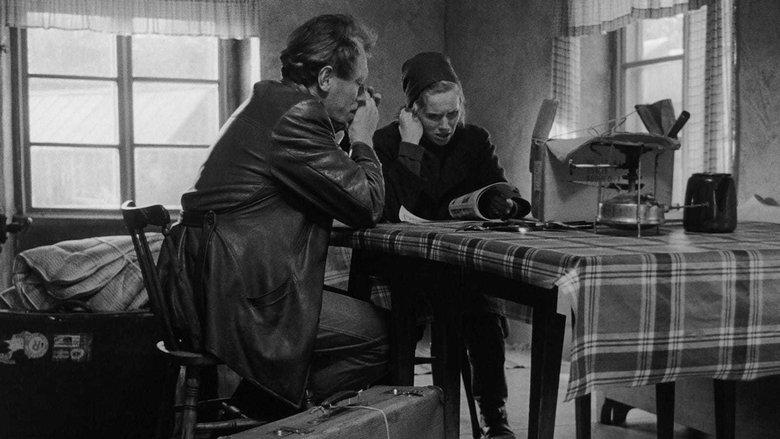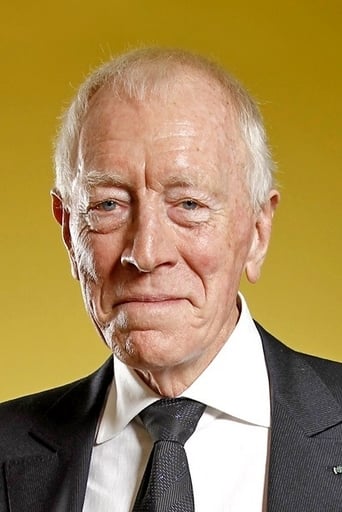

Shame (1968)
In the midst of a civil war, former violinists Jan and Eva Rosenberg, who have a tempestuous marriage, run a farm on a rural island. In spite of their best efforts to escape their homeland, the war impinges on every aspect of their lives.
Watch Trailer
Cast


Reviews
The film may be flawed, but its message is not.
Story: It's very simple but honestly that is fine.
Blistering performances.
While it doesn't offer any answers, it both thrills and makes you think.
In the first twenty minutes we grow to adjust to the rich normality of these lives, and then the bombs start falling. War changes everything. Beautifully photographed, acted and written obviously. This film is a triumph.The proper aspect ratio, unlisted on IMDb at time of writing, is 1.33.1, and it is correct on DVD from Distinction Series from Region 4, though I can't speak for any other releases. The transfer is nice too for DVD. This ranks as one of the best Bergman films I've seen and one of the best war films I've seen. Can't recommend it highly enough. 10/10
As a matter of fact, I also call it one of Ingmar Bergman's best, along with The Seventh Seal, Fanny and Alexander, Wild Strawberries, Cries and Whispers, Persona and The Passion of Anna. Not everybody perhaps is going to like it, whether you are familiar with Bergman or not, due to how bleak and lacking in optimism it is. But I don't consider this a bad thing in the slightest, seeing as this bleakness and nightmarish feel is very realistic and in a remarkably compelling way. As you'd expect from a Bergman film, his direction is superb and the quality of the production values are very high especially in the atmospheric cinematography. The lack of any music adds to the suspense and unrelenting power of the story, while the dialogue provokes thought and the story really hit me hard, not because of the subject matter's bleakness but more how realistically everything was portrayed. The characters are not characters that you like all at once or immediately relate to, nor are you intended to, Eva is the most sympathetic somewhat though I imagine that there will be those turned off by Jan's selfishness and treacherousness. These character traits are reflected perfectly in the performances. Three of the most prolific actors in Bergman's resume, and three of the best as well. With her ever expressive eyes and helped by Bergman's trademark handling of his female roles, Liv Ullmann is movingly tender while bringing a certain determination to her character. Max Von Sydow brings a magnetic quality to every performance he gives, and his performance in Shame is no exception, his face speaks volumes in particular. Gunnar Bjornstrand evokes chills as the Colonel, making you thoroughly believe in the corrupt nature of his character. All in all, Shame is a brilliant film, not one that everybody will love but not to the extent that it becomes polarising. 10/10 Bethany Cox
Dubbed a masterpiece by almost every critic I respect. I certainly thought was a brilliantly well made film, but one that didn't give me the kind of devastating emotional effect experienced by so many. In fact, going in knowing little about the film, part of what I liked about it would seem like sacrilege to most of those who see the film as completely, unbearably bleak. I may be insane, but I actually found a good portion of it powerfully, blackly funny, in a sort of 'Dr. Strangelove', Roy Andersson sort of way. The surreal insanity of the behavior of the soldiers and officials around our normal working-class couple seemed so exaggerated, almost Keystone Cops with guns, that it DID seem effectively anti-war, but not in the way seen by those who write of unrelieved depression and misery being where the film got its power. That said, it certainly seemed to grow ever more 'real', and by the end felt truly dramatic and haunting. I wonder how I could so misread Bergman's intentions. Certainly, if we're supposed to take the early to middle completely seriously and literally the film works much less well for me than it did, since the horrors these people are exposed to on a literal level seem like nothing compared to the victims of 'real world' wars, where they probably would have been dead very quickly. Take this for what it probably is - an odd outlier opinion, and one that may be replaced when I see the film again. But then, hopefully the occasional outlier can supply a useful alternate point of view.
This begrudging and angry film is against not just the war during which it was made, but all war. It doesn't care what war it is. It might be the most emotionally involving experience I have ever had with Ingmar Bergman's work. There are no sides to the two main characters in this impacting drama, which doesn't intimate a point in any ceremonial symbolism as per Bergman's usual, but plainly showcases people and their lives and exercises what Bergman has already proved he understands about a person's reaction to a movie.His top-drawer regulars Liv Ullmann and Max Von Sydow play an internalizing but bickering married couple who were once orchestra musicians. Now they live in a weathered farm house on an island. Part of the building frustration we grow to share with these two people fertilizes in the detail that nothing in their house seems to work. They are not reclusive intellectuals, either. They are a rather familiar marriage that has more or less resigned from life and is essentially apolitical; they only get wind of distant rumors of a war that has been going on forever. Ullmann is concerned with the danger to their lives and to her desire to bear children. Her husband Von Sydow shrugs off that the war will pass them by. Their serenity is interrupted by screaming fighter planes flying low over their house, the killing of a parachuting airman, the arrival of dubious troops, their inquisition, and eventually their capture by what appears to be the local side, but loyalties have long since splintered. They are sent back to their home, witness gratuitous destruction and suffer the vindictive consequences of such an agonizingly distrustful marriage. This, one of my top favorite Bergman efforts, is a study of a couple jarred from their safely self-unaware lives and violated by a manipulative despair, testing them both to reveal who they really are. She lacks compassion to some extent, too self-serving and restless to have any patience for his capricious breakdowns into crying. His suppressed emotional issues have led to the repression of the very initiative and excitement that attracted them to begin with. The immense last twenty minutes, sporadically interrupted by images of the overwhelming gray sky, are among the closest to real emotion that Bergman ever filmed.All systems of dogma and faith are the antagonists in this very essential and downbeat portrait. The basically clearcut personalities of Ullmann and Von Sydow's characters are hurled into the degenerate world of war because they are accused of being "sympathizers," but the film, shot on Bergman's small home island of Faro, doesn't give any information about where or when it's set, who the two sides are, and for what they're fighting. To an uninvolved civilian caught in between, the knowledge base is likely to be quite similar.Ullmann and Von Sydow are not sympathizers for the apparent enemy, but they're partisans for who are apparently their side. This 1968 reactive allegory could be about the common noncombatant citizens of Iraq, or Kosovo, or Vietnam, or Israel, or Palestine, or...




